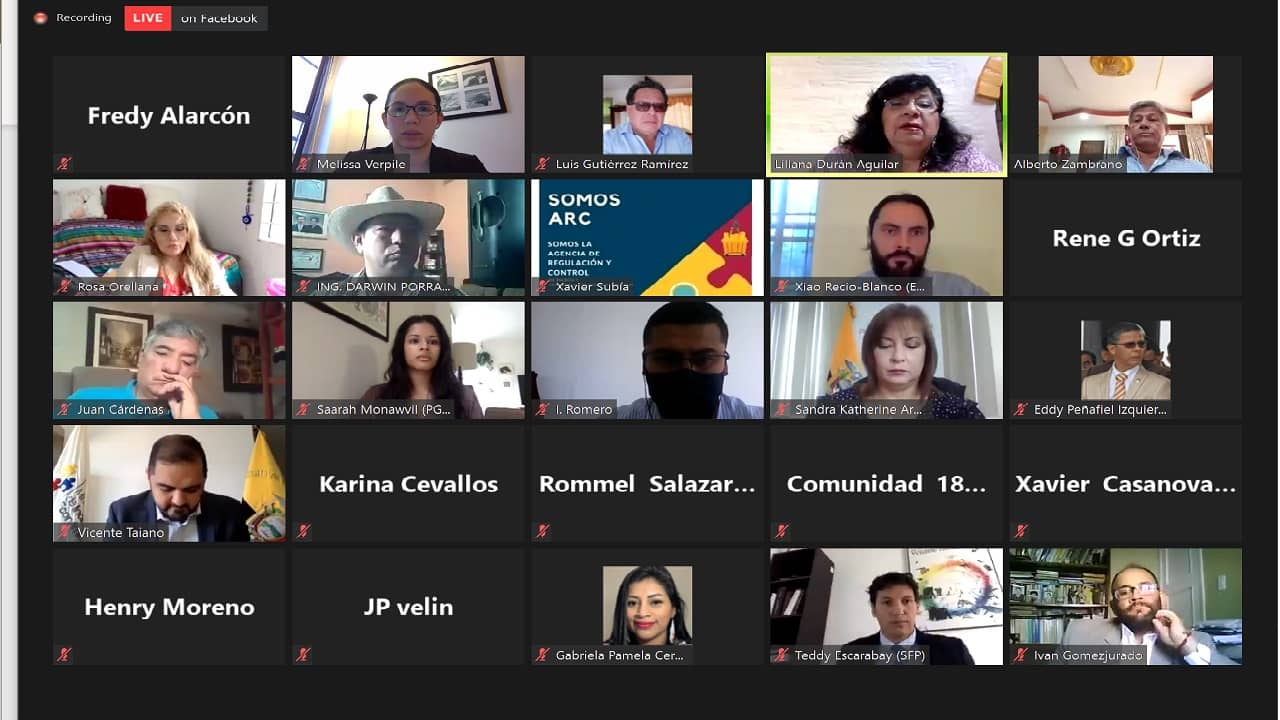
Quito/ New York – On 30 November 2020, the Commission on Biodiversity and Natural Resources of the National Assembly of the Republic of Ecuador discussed the urgent need to mobilize support for small-scale fisheries to secure the livelihoods of coastal communities amid the COVID-19 pandemic. This meeting was led and moderated by Secretary Luis Gutiérrez Ramírez and Commission President Asambleísta Alberto Zambrano and held within the framework of the 61st ordinary session. The Committee counted on the participation of the Minister of the Environment and Water Mr. Paulo Proaño, the Minister of Urban Development and Housing Mr. Julio Recalde, as well as that a representative of the Ministry of Energy and Natural Resources.
Asambleísta Liliana Durán, PGA Member, introduced to the Committee the work of the Ecuadorian National Chapter of Parliamentarians for Global Action (PGA) and explained how members of this group in parliament are working together towards fighting IUU Fishing and promoting sustainable small-scale fisheries and the access of small-scale artisanal fishermen to marine resources and markets. She also highlighted the importance of a legal, regulatory, normative/institutional framework that recognizes and protects access rights for small-scale fishers.
Asambleísta Durán stressed the importance of discussing small-scale fishing as it relates to food security and sovereignty. With reference to food sovereignty mentioned in Article 281 of the Constitution of the Republic of Ecuador, she recalled that small and medium-scale fishing is a means of subsistence for many Ecuadorian families, and that it encourages internal food development which is part of Ecuador’s principle of food sovereignty. Furthermore, she highlighted the problems that afflict this sector such as illegal fishing, the lack of security measures and the lack of protection of labor rights which are exacerbated by the COVID-19 pandemic. Without law enforcement or new reforms, small-scale fishing will be greatly affected.
Guest speaker Dr. Xiao Recio-Blanco, Director of the Oceans Program at the Environmental Law Institute (ELI) provided a briefing to the lawmakers on the Toolkit for Sustainable Small-Scale Fisheries, a joint project among ELI and PGA. Dr. Recio-Blanco emphasized that for the fisheries laws to be “sustainable,” the legal text must translate marine and environmental science into a useful language for the manager. Currently, countries are adding the concept of sustainability to their fishing law, but without developing the concept. The joint project analyzes various options for regulatory texts that are used in a number of countries to ensure the sustainability of the small-scale fishing sector with the purpose of centralizing the information in order to make it available to legislators so that they can use it and can replicate it in other regions and countries.
Mr. Enrique Alonso Global Fisheries Director of the Sustainable Fisheries Partnership (SFP) explained the principle of fisheries co-management, a mechanism that improves the management of resource management at the national level and that ensures sustainability. Ecuador's new aquaculture and fishing law contemplates the development of management plans as a basis for managing the effects of COVID-19 on national food security and on the decrease in the income of small-scale fishermen. The basic principles of co-management are: 1. Build on the best knowledge of the resource and the ecosystem. 2. The shared responsibility in the management of resources through collaboration mechanisms for regulated and transparent fisheries management between the state and the interested parties. Among the main challenges he highlighted were the creation of a new governance model, the time that it takes to transfer scientific information to the artisan sector and the construction of a new relationship between the sector and the state; while among the benefits he underscored that this mechanism reduces the costs of fisheries management, facilitates compliance, gives greater legitimacy and generates inclusive management plans with balanced goals.
In Ecuador there is already one co-management initiative that is being implemented in the country and may serve as an example to expand co-management to other fisheries in Ecuador. The Sustainable Dialogue Platform for the Small Pelagic Fishery in Ecuador is a project that seeks to build a discussion platform in which the interested parties generate a management plan on the management of the ecosystem and the resources that form part of the small pelagic fishery; with social, economic and environmental objectives. Ecuador's new aquaculture and fishing law lays the foundations for this participatory management.
Asambleísta Rosa Orellana underlined the importance of this meeting which helped the committee members to gain a greater understanding about the SSF sector and nurtures the management of sustainable fishing. The meeting was attended by over 90 participants.
